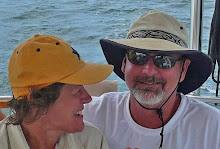
I believe voyaging to be very supportive and conducive environment for our spiritual journey and like all powerful experiences it will be the metaphor and the thing itself. Eastern religion and spiritual traditions have enticed and guided my entire adult life. Buddhist think of life as a journey of spiritual development and refer to it as following the dharma or path. That is the eightfold path of wisdom, ethical conduct & mental development described by Buddha as our way out of the cycle of suffering. Other teachers have set out similar guidelines such as; Thich Nhat Hanh’s 14 Mindfulness Trainings and Patanjali’s Yamas & Niyamas in his Yoga Sutras.
I think that the cursing lifestyle will be particularly conducive and supportive to one of the yama’s (aparigraha) and all of the niyamas. Aparigaha is the freedom from possessions achieved by limiting one’s possessions to only what is necessary and cultivating the requisite nonattachment to one’s possessions that allows a person to rid themselves of unnecessary things.
The niyamas are:
Saucha = Cleanliness. Cleanliness and order has always been a strong value in the history of seamanship although this niyamas isn’t just limited to the physical realm, it also applies to purity of the mind & sprit.
Santosa = Contentment. Sailors have traditionally been a happy and contented lot because at sea one generally doesn’t have the opportunity to “get more”. You have what you set out with or less as you use supplies. It”s up to the sailor to accept the limitations of the situation and maintain a contented attitude. This sentiment is reflected in a sailor’s simple prayer: All I ask for is a good ship and a star to guide her by. Santosa makes it plain that contentment is more about one’s own attitude than the possessions one has. That’s why it’s possible for the poor to be happy and contented and the rich can be moved by greed and be filled with unhappiness.
Tapas = Heat or spiritual austerities. This implies any kind of self-restraint and self-constraint for the sake of overcoming one’s vices. Doing without, enduring extreme climatic conditions, living in close quarters and limited access to fresh water are all examples of the tapas one might experience cruising on a small boat.
Svadhyaya = Self-study. Means spiritual self-directed study. When one is out cruising one has limited access to a spiritual teacher and must become much more self-reliant in there practice.
Isvara pranidhana = Surrender to God. Once out on the ocean, far away from land and its distractions, one becomes much more aware of god and there proper place in the universe.
The sea takes trouble from you
takes worry and fear and illusion and anger
and joy and joking and plans and ambition
and love from you.
Takes them, scatters them, gathers them,
gives them back to you
not so big or important as before.
You're not anyone, really;
you never were.
Oh, you thought you were,
when your head was too small for your illusions.
But illusions aren't important, now:
you don't have to be anything,
even yourself, because yourself
was only something you had to make up,
and then you thought
you had to carry it around with you.
What a relief to lay it down, walk away and forget it.
Just to be part of what's around you is enough.
Gordon Bok

